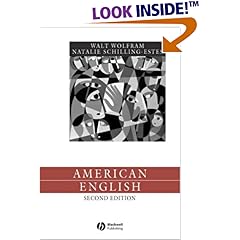This blog contains the description on the phenomena in language, society, and culture
Saturday, August 23, 2008
American English: Dialects and Variation (Language in Society)
Review
“This book has become a staple in the study and instruction of American English… The second edition provides the same balance of detail, clarity, breadth and sophistication offered by the first edition, but with an improved organization and up-to-date information. It is clear that the authors took seriously the task of revising and updating this new edition so that its users could enjoy the maximum benefits of its structure and contents. They will be pleased to know that their efforts were not in vain. The book will undoubtedly continue to be used as one of the key texts in the instruction of American dialects for many years to come.” Journal of Sociolinguistics
"This is an indispensable book, not just for students but for anyone who wants to know how the English language varies in the United States and how this variation has been studied… It is comprehensive, comprehensible and dense with detail." Language in Society (of the previous edition)
"The strengths of the book include its style and the authors’ consideration of how the book might actually be used as a text… the chapters are divided into subsections with helpful headings; exercises calling for creative responses by students are scattered throughout… each chapter ends with a short annotated bibliography for further readings." Language (of the previous edition)
Description
This book provides a very readable, up-to-date description of language variation in American English, covering regional, ethnic, and gender-based differences.
* contains new chapters on social and ethnic dialects, including a separate chapter on African American English and more comprehensive discussions of Latino, Native American, Cajun English, and other varieties,
* includes samples from a wider array of US regions
* features updated chapters as well as pedagogy such as new exercises, a phonetic symbols key, and a section on the notion of speech community
* accessibly written for the wide variety of students that enrol in a course on dialects, ranging from students with no background in linguistics to those who may wish to specialize in sociolinguistics
Subscribe to:
Post Comments (Atom)

No comments:
Post a Comment